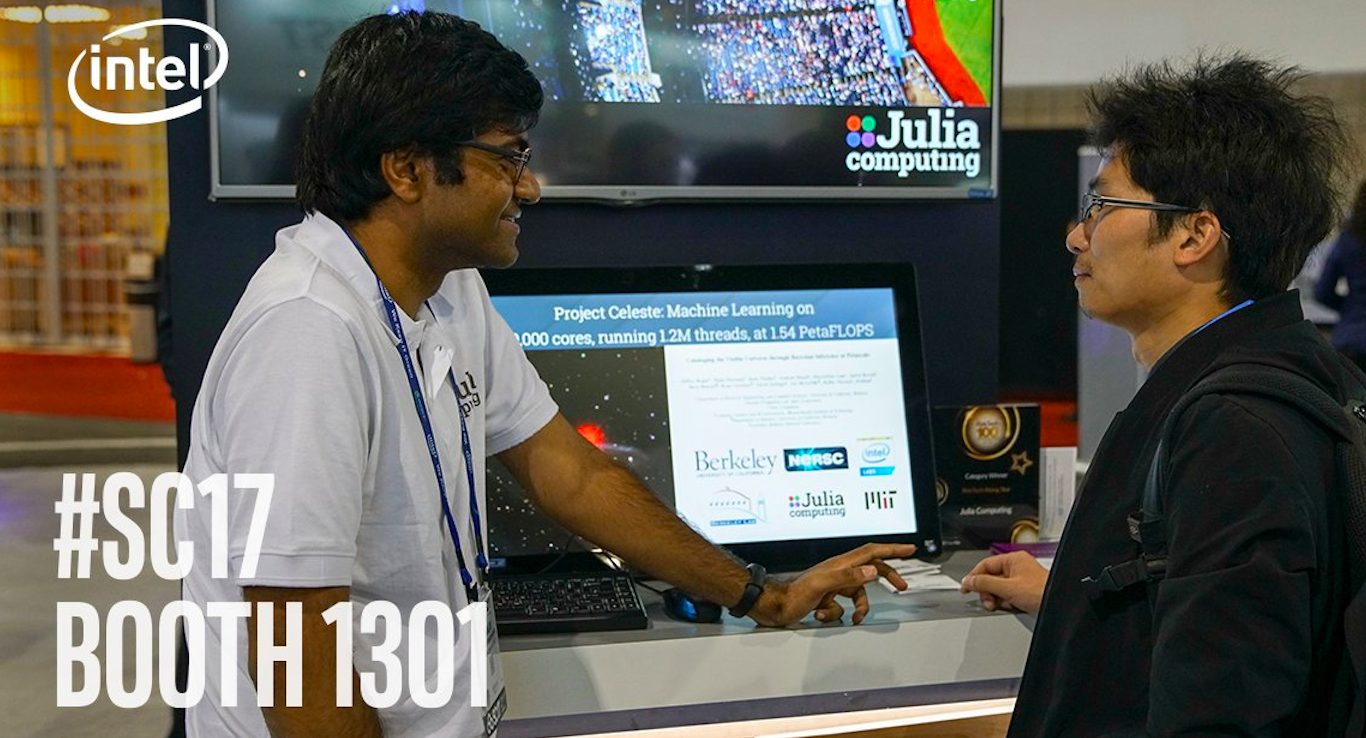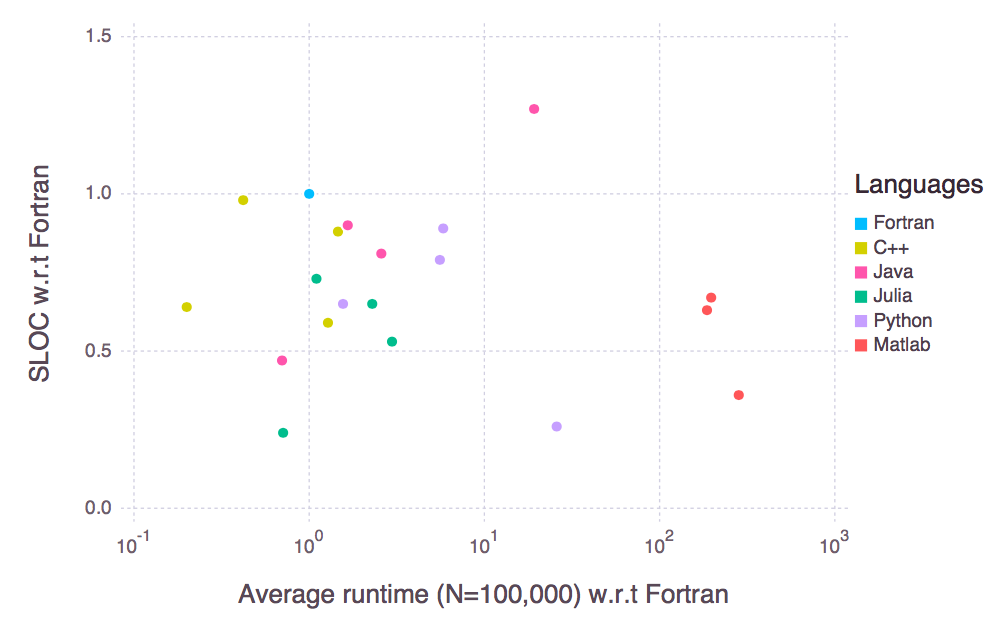Newsletter December 2017
Happy holidays from Julia Computing and best wishes for a prosperous and productive 2018.
-
New Julia Developments
-
Major New Release of DataFrames.jl v0.11
-
JuliaBox - Commercial Version Now Available for University and Corporate Users with Enhancements and Support
-
Improved C++ Interoperability Interface
-
JuliaPro Amazon Machine Image and Docker Image
-
Julia Computing at SC17 and Intel HPC Developer Conference
-
Julia Computing at Analytics Vidhya’s DataHack Summit, Sponsored by Intel
-
Julia for Astrodynamics
-
Julia in Linux Magazine
-
Julia and Julia Computing in the News
-
Julia en Français
-
Upcoming Events Featuring Julia
-
Recent Events Featuring Julia
-
Contact Us
___
-
New Julia Developments
New Julia Developments
i. Major New Release of DataFrames.jl v0.11:
DataFrames v0.11 has been released by the Julia community with a number of important updates:
-
‘NA’ has been replaced with ‘missing’, making it much easier to work with missing data
-
Faster joining and grouping
-
Better display of DataFrames
-
Improved documentation
-
Modeling features are now in StatsModels.jl, whereas data import/export features are now in CSV.jl
-
Many other improvements
Don’t let the version number fool you. This version has been in the works for a long time, and leverages important new features in the Julia compiler. See the release announcement and try it out!
ii. JuliaBox - Commercial Version Now Available for University and Corporate Users with Enhancements and Support:
In response to user demand, Julia Computing has introduced a new and improved JuliaBox experience with increased memory and more support. For pricing and more information about the new commercial version of JuliaBox, please contact us. The free version of JuliaBox remains available for current and new users.
iii. Improved C++ Interoperability Interface:
Cxx.jl and CxxWrap.jl allow users to wrap C++ libraries in Julia. Use Cxx.jl to write the wrapper package in Julia code or CxxWrap.jl to write it entirely in C++ and call from Julia with a single line of Julia code. It is also possible to write and call Julia code from within C++, giving Julia and C++ complete two-way interoperability.
iv. JuliaPro Amazon Machine Image and Docker Image:
JuliaPro, the fastest on-ramp for quants, data scientists and researchers, is now available as an Amazon Machine Image on AWS EC2 (Red Hat Enterprise Linux v7.4 and Ubuntu 16.04) and as a Docker image (Ubuntu 16.04 and Centos 7) for use in containerized environments such as Kubernetes. More information is available here.
-
Julia Computing at SC17 and Intel HPC Developer Conference
Julia Computing at SC17 and Intel HPC Developer Conference
Denver hosted the Intel HPC Developer Conference November 11-12 and SC17 November 12-17. Julia Computing participated in both conferences and presented the Celeste case study, one of the latest and most exciting developments in high performance computing using Julia. Julia Computing’s Ranjan Anantharaman was recognized for providing the Best Tutorial at the Intel HPC Developer Conference.  Julia Computing’s Ranjan Anantharaman (left), winner of the Best Tutorial Award at the Intel HPC Developer Conference 2017
Julia Computing’s Ranjan Anantharaman (left), winner of the Best Tutorial Award at the Intel HPC Developer Conference 2017
-
Julia Computing at Analytics Vidhya’s DataHack Summit, Sponsored by Intel
Julia Computing at Analytics Vidhya’s DataHack Summit, Sponsored by Intel
Julia Computing was featured as part of the Intel keynote presentation about the future of high performance computing at Analytics Vidhya’s DataHack Summit in Bangalore, India held November 9-11. Julia Computing’s Rajshekar Behar presented Julia’s work with Celeste, Intel and Intel Skylake architecture.
-
Julia for Astrodynamics
Julia for Astrodynamics
Helge Eichhorn, Software Engineer at Telespazio VEGA Deutschland, presented Astrodynamics.jl: An Open-Source Framework for Interactive High-Performance Mission Analysis at the Open Source Cubesat Workshop on Nov 23 at the European Space Operations Center (ESOC/ESA) in Darmstadt, Germany. 
-
Julia in Linux Magazine
Julia in Linux Magazine
Professor Mark Vogelsberger, Theoretical Astrophysicist at MIT, published an article in Linux Magazine in Jan 2016 titled “Getting Parallel: Creating Parallel Applications with the Julia Programming Language.” According to Professor Vogelsberger: “The Julia code is ... more than 100 times faster than the equivalent Python code. Multiple dispatch with function calls gives Julia extremely efficient code that is practically superior to any high-level language. Faster code in Julia can be achieved without any tricks like vectorization or outsourcing to C extensions. By contrast, such tricks are often necessary to speed up Python or R code.”
-
Julia and Julia Computing in the News
Julia and Julia Computing in the News
-
Tangent Works Uses Julia to Win IEEE Global Energy Forecasting Competition 2017: Tangent Works, a European machine learning company, used Julia to win the IEEE Global Energy Forecasting Competition 2017 (GEFCom2017).
-
Julia Featured in insideHPC’s “AI-HPC Is Happening Now” White Paper: insideHPC, a leading blog in the high performance computing community, featured Julia and Julia Computing in this white paper about artificial intelligence and high performance computing.
-
Julia Climbs to #35 on TIOBE Index of Most Popular Programming Languages: Julia entered the Top 50 most popular programming languages for the first time in September 2016, and has climbed to #35 since last year.
-
Julia Computing Featured Among 10 Most Innovative Startups in India That Will Rule in 2018 and Beyond: KnowStartup featured Julia Computing among the 10 Most Innovative Startups in India That Will Rule in 2018 and Beyond.
-
Julia Language Delivers Petascale HPC Performance: TheNextPlatform explains that “the Celeste team demonstrated that the Julia language can support both petascale compute and terascale big data analysis on a leadership HPC system plus scale to handle the seven petabytes of data expected to be produced by the Large Synoptic Survey Telescope (LSST) every year.”
-
Julia Computing CEO Viral Shah Featured in FactorDaily Outliers Podcast: FactorDaily’s Outliers Podcast with Pankaj Mishra featured an interview with Julia Computing CEO Viral Shah: “You can thank Viral, ... along with Alan Edelman, Jeff Bezanson, Stefan Karpinski, Keno Fischer and Deepak Vinchhi ... the next time you have a safe flight in US airspace.”
-
Intel Reports Faster Stock Price Estimation Using Julia: @IntelBusiness reports that Julia Computing’s stock price estimation tool runs up to 38% faster - “a big gain for a fast-moving industry.”
-
Plotting in Julia: Tom Breloff published a blog post titled “Plots: Past, Present and Future” about plotting in Julia.
-
Feigenbaum’s Alpha: Professor Stuart Brorson from Northeastern University’s Department of Mathematics published a blog post entitled “A High Precision Calculation of Feigenbaum’s Alpha in Julia”.
-
Julia en Français
Julia en Français
Xavier Gandibleux, Professor of Operations Research and Computer Science at the Université de Nantes, is writing a book in French about using Julia and JuMP for modeling and solving linear optimization problems in Operations Research.
-
Upcoming Events Featuring Julia
Upcoming Events Featuring Julia
Do you know of any upcoming conferences, meetups, trainings, hackathons, talks, presentations or workshops involving Julia? Would you like to organize a Julia event on your own, or in partnership with your company, university or other organization? Let us help you spread the word and support your event by sending us an email with details. Here are some upcoming events:
-
Sydney: Intro to Julia from a Data Perspective: Can It Be the Fastest Too? Dec 7
-
Lorient, France: ROADEF 2018 Feb 21-23 “Julia, JuMP for Operations Research”
-
Recent Events Featuring Julia
Recent Events Featuring Julia
Do you want to share photos, videos or details of your most recent conference, meetup, training, hackathon, talk, presentation or workshop involving Julia? Please send us an email with details and links.
-
Gold Coast: ACEMS 2017 Retreat Oct 30-Nov 3 “Intro to Julia”
-
London: Quant Insights Conference Nov 7-10
-
Bangalore: Julia Computing Workshop at IoTNext Nov 9 and Analytics Vidhya’s DataHack Summit, Nov 9-11
-
Denver: Intel HPC DevCon Nov 11-12 and SC17 Nov 12-17
-
Johannesburg: Hello Julia Nov 14
-
Warsaw: Using JuMP to Optimize the Location of Medical Accelerators Nov 16
-
Sydney: Numerical Computing with Functions in Julia Nov 16
-
Copenhagen: Machine Learning in Julia Nov 20
-
Darmstadt: Open Source Cubesat Workshop European Space Operations Center (ESOC/ESA) Nov 23-24 “Astrodynamics.jl: An Open-Source Framework for Interactive High-Performance Mission Analysis”
-
New York: PyData Nov 27-30 and Diversity & Inclusion in Scientific Computing (DISC) Unconference Nov 29-30
-
Pasadena: SoCal Julia Meetup Nov 28
-
Cleveland: Paired Programming for Kaggle’s Statoil/C-CORE Iceberg Classifier Competition Dec 2
-
Bay Area: Talk Toolstacks - Julia, Python, R, ?, JuliaBox, Jupyter, RStudio? Dec 2
-
Berlin: Introduction to GPU Programming Using Julia Dec 5
-
Contact Us
Contact Us
Please contact us if you wish to:
-
Purchase or obtain license information for Julia products such as JuliaPro, JuliaPro Enterprise, JuliaRun, JuliaDB, JuliaFin or JuliaBox
-
Obtain pricing for Julia consulting projects for your enterprise
-
Schedule Julia training for your organization
-
Share information about exciting new Julia case studies or use cases
-
Spread the word about an upcoming conference, workshop, training, hackathon, meetup, talk or presentation involving Julia
-
Partner with Julia Computing to organize a Julia meetup, conference, workshop, training, hackathon, talk or presentation involving Julia
About Julia and Julia Computing
Julia is the fastest high performance open source computing language for data, analytics, algorithmic trading, machine learning, artificial intelligence, and many other domains. Julia solves the two language problem by combining the ease of use of Python and R with the speed of C++. Julia provides parallel computing capabilities out of the box and unlimited scalability with minimal effort. For example, Julia has run at petascale on 650,000 cores with 1.3 million threads to analyze over 56 terabytes of data using Cori, the world’s sixth-largest supercomputer. With more than 1.2 million downloads and +161% annual growth, Julia is one of the top programming languages developed on GitHub. Julia adoption is growing rapidly in finance, insurance, machine learning, energy, robotics, genomics, aerospace, medicine and many other fields.
Julia Computing was founded in 2015 by all the creators of Julia to develop products and provide professional services to businesses and researchers using Julia. Julia Computing offers the following products:
-
JuliaPro for data science professionals and researchers to install and run Julia with more than one hundred carefully curated popular Julia packages on a laptop or desktop computer.
-
JuliaRun for deploying Julia at scale on dozens, hundreds or thousands of nodes in the public or private cloud, including AWS and Microsoft Azure.
-
JuliaFin for financial modeling, algorithmic trading and risk analysis including Bloomberg and Excel integration, Miletus for designing and executing trading strategies and advanced time-series analytics.
-
JuliaDB for in-database in-memory analytics and advanced time-series analysis.
-
JuliaBox for students or new Julia users to experience Julia in a Jupyter notebook right from a Web browser with no download or installation required.
To learn more about how Julia users deploy these products to solve problems using Julia, please visit the Case Studies section on the Julia Computing Website.
Julia users, partners and employers hiring Julia programmers in 2017 include Amazon, Apple, BlackRock, Capital One, Citibank, Comcast, Disney, Facebook, Ford, Google, IBM, Intel, KPMG, Microsoft, NASA, Oracle, PwC, Uber, and many more.
About the Author

JuliaHub
Discover key content authored by JuliaHub experts. Stay updated on innovative practices in scientific and technical computing.


.jpg)
